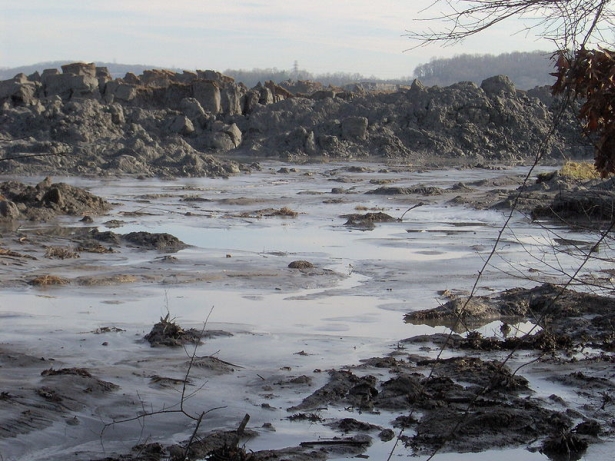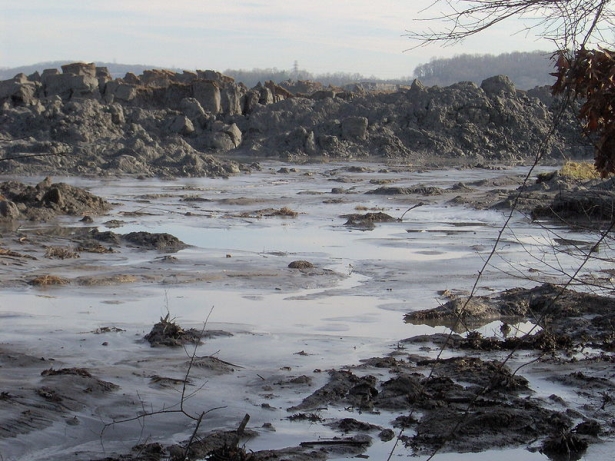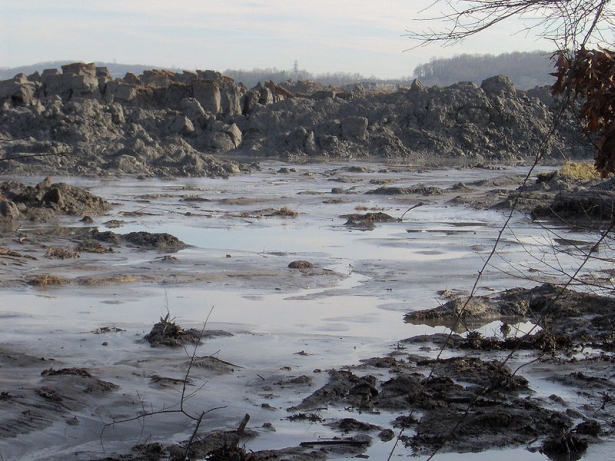Tennessee
-
Was the Tennessee coal ash disaster really a once-in-a-lifetime event?
A new report from an engineering firm hired by the Tennessee Valley Authority identified factors behind last year’s disaster that unleashed more than a billion of gallons of toxic ash from a massive storage pond at the federal company’s Kingston plant in eastern Tennessee. It claims that the disaster was a one-of-a-kind event — but […]
-
Audit finds Tennessee Valley Authority misled on ash spill disaster
The Tennessee Valley Authority’s Inspector General released a critical audit this week on the federal company’s response to last December’s massive ash spill disaster at its Kingston power plant in eastern Tennessee’s Roane County. The incident involved a failure in a coal ash containment pond that released more than a billion gallons of toxic waste […]
-
Must-read new story on the Tennessee coal ash disaster and the myth of “clean coal”
Stop what you’re doing and proceed immediately to the current issue of GQ magazine, which contains a blockbuster piece of investigative journalism: “Black Tide,” by Sean Flynn. Here’s the slug: Just days before Christmas last year, an environmental disaster one hundred times the size of the Exxon Valdez (yes, you read that right) unfolded on […]
-
Pennsylvania rejected TVA coal ash that’s going to poor communities in Alabama and Georgia
Some of the more than 1 billion gallons of toxic coal ash that spilled from an impoundment at the Tennessee Valley Authority’s Kingston power plant in eastern Tennessee last December is making its way to landfills in poor and black communities in Alabama and Georgia, as we reported last week at Facing South. It turns […]
-
Debate: Roberts v. ‘clean coal’ flack Joe Lucas
In early April, the excellent investigative journalism show NOW on PBS ran an episode called “Can Coal be Earth-Friendly?“ In conjunction with the episode, NOW hosted an online debate between me and Joe Lucas, spokesflack for the American Coalition for Clean Coal Electricity (ACCCE). We were given a series of five questions. We each answered […]
-
TVA: making Bozo look good
"Last week, I called TVA a bunch of arrogant Bozos. I guess I should have said arrogant clowns."
-- Sen. Tim Burchett, at a Congressional hearing on the Tenn. coal ash spill, explaining that he meant no offense to Bozo the Clown
-
TVA watchdogs arrested, harassed
Matt Landon deserves a Medal of Honor -- he's a modern day Tennessee Volunteer and American hero.
After billion of gallons of toxic coal sludge broke through the TVA coal ash pond on Dec. 22, he and the United Mountain Defense nonprofit organization have worked full-time through the holidays and winter to deliver aid and water, assist the affected residents, collect data, and provide professional air and water monitoring.
National and international media have relied on Landon's dogged and insightful reporting behind the scenes. Landon has given tours to untold numbers of legal and legislative aides, including Robert C. Tanner the Majority Senior Investigator for Senate Committee On Environment & Public Works.
Considering the gross negligence of the TVA, and the whopping $825 million bill for clean up costs, you would think the TVA had enough sense to recognize Landon's and UMD's important role and accept their help.
Instead, the TVA police have not stopped harassing, detaining, and arresting Landon and other members of the United Mountain Defense.
-
TVA could have planned for a normal accident such as the coal ash spill in Kingston, Tenn.
Those coal ash spills should have been expected.
Normal Accidents is a 25-year-old book by Charles Perrow, subtitled "Living with High-Risk Technologies." Perrow, reflecting on the Three Mile Island nuclear incident and other accidents, argued that modern advanced technologies are so complex, and require such careful monitoring and management, that accidents, including potentially massive system failures, have to be considered "normal," not exceptional, events.
The technologies he wrote about included many we consider commonplace today, but climate change and other global environmental impact risks were not among the "accidents" he anticipated.
Economists seem to have learned precious little from the book, highly acclaimed as it was. Economic calculations still get made on the basis of "expected values" -- the statistically most likely outcomes -- despite the fact that these values do not accommodate the virtual certainty of unexpected events.
Analyses like Environmental Impact Statements -- required for major federal investments under the National Environmental Policy Act -- are still based on what economists call "expected utility theory" (EUT). Based on past experience and recorded data, we project the probability of different events and use those odds in combination with the "utility" or value associated with each alternative event to arrive at an expected value for a course of action.
That doesn't make sense ... or does it?
-
What's it going to take to enact proactive energy and environmental policy?
While the TVA hand-wringing went on at Senate hearings in Washington, D.C., another coal pond broke last week at the Widows Creek Fossil Plant in Jackson, Ala.
Not that we didn't know: Widow Creek was listed in a recent Environmental Integrity Project report as one of the worst 50 coal-fired power plant pollution "wet dumps" because of its toxic metals.
The "spill," this time in Alabama, according to the first reports, leaked "only gypsum."
Earlier this week, coal sludge was released into the Ocoee River Gorge in eastern Tennessee, as the TVA sought to repair a sediment dam. According to the state Department of Environment and Conservation, "Forest Service employees were walking the stream bank picking up what dead fish they could find ... No live fish were seen."
These accidents beg the question: How much longer are we going to sit back and allow crisis management to determine our energy and environmental policies?
What's it going to take? Dead bodies?
As Appalachian Voices editor Bill Kovarik pointed out, "The effusive praise in the hearing Thursday morning Jan. 8 went beyond the standard courtesies afforded witnesses in Senate hearings, perhaps because it was clear that the TVA's CEO was a relic of a bygone age who would need to be handled with respect and care as he was ushered out the door."
Instead of courtesies and crisis management, we need to:
- Phase-out all wet storage of toxic coal ash.
- Inspect all toxic coal ash storage and disposal units.
- Enact federal regulation of all toxic coal ash storage and disposal.
In the meantime, the EIP report found:




